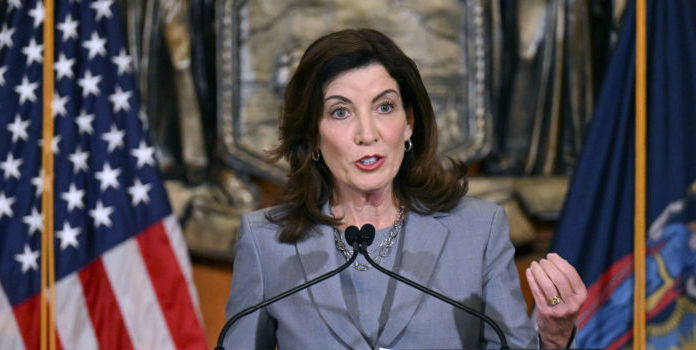(Headline USA) N.Y. Gov. Kathy Hochul released an update to the state’s five-year financial plan earlier this week, and it shows the current economic conditions will likely have long-term implications for the state.
While the current fiscal year’s budget remains balanced, the state’s Division of the Budget has slashed expectations for personal income tax receipts over the next four years.
A release from Hochul’s office said that’s “in recognition of a weaker economic outlook” for the state and country.
In turn, that’s leading to forecasted gaps in future budgets. The 2023-24 fiscal year budget is expected to have a $310 million hole, but the deficits grow substantially larger. It’s a $3.59 billion deficit for 2024-25 and $6.22 billion for 2026-27.
Part of the problem for the state is the bear market Wall Street’s enduring right now. Revenues created by the markets are a significant source of tax revenue for New York.
Hochul said the state is prepared to meet the challenge despite the red numbers.
“Like the rest of the country, New York state is facing substantial headwinds with a changing national economy, and our latest update to the Enacted Budget Financial Plan reflects that,” Hochul said.
“While the plan incorporates future budget gaps, our commitment to fiscal discipline and planning for a rainy day remains, and reserve fund deposits and balances will stay at the elevated levels we have planned.”
Through the end of March, the end of the 2021-22 fiscal year, New York had nearly $9 billion in reserves, and Hochul said the state plans to more than double that over the next three years.
An expected $19.4 billion reserve for 2024-25 would equate to 15% of the state’s operating funds.
While Hochul touts a strong reserve, some critics say the state would have been better off tamping down the massive spending in the current fiscal year budget.
The $220 billion budget is $8 billion more than last year, and it exceeds the 2020-21 budget by more than $40 billion.
Peter Warren, director of research at the Empire Center for Public Policy, noted in an analysis this week that the deficits could grow if the governor winds up signing bills into law that come with serious fiscal implications.
One such bill would allow the state to award tax credits to companies manufacturing semiconductors in the state, provided they reduce greenhouse gas emissions and look to hire workers from disenfranchised populations.
The “Green Chips” tax credits could total $10 billion over the next two decades.
“Hochul is expected to sign it into law,” Warren wrote. “If she does, it will be with full knowledge that it will deepen the deficits DOB now forecasts.”
Adapted from reporting by the Center Square

